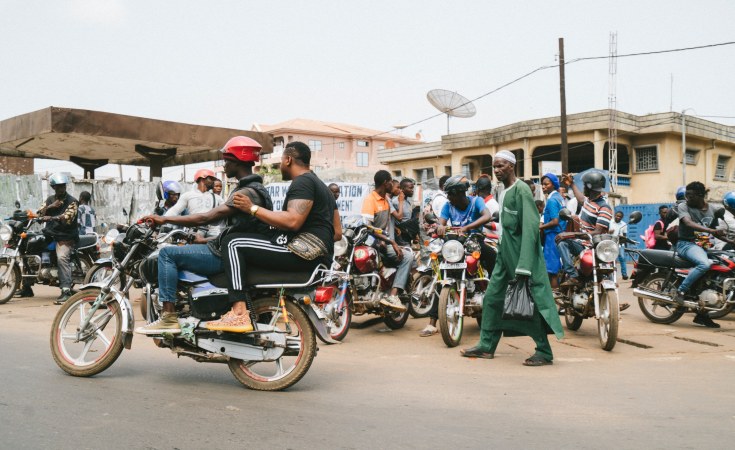IT is no longer news that the Lagos State Government has placed a ban on operations of commercial motorcycles, better known as Okada in six local government areas of the state. To refresh memories, the six LGAs are Eti-Osa, Ikeja, Lagos Island, Lagos Mainland, Apapa and Surulere, and security operatives have been tasked to enforce the proscription order across the listed councils.
As I noted in last week's edition of this column, this is not the first time that Okada will be banned in Lagos; all of Governor Babajide Sanwo-Olu's predecessors in office had placed a ban or restricted their movements one way or the other. The issue is that the Okada problem has worsened over the years and can only worsen further if an organic, self-sustaining approach to the issue is not adopted.
Besides, next Wednesday, June 1, 2022 when the ban will go into effect, there will be much huffing and puffing by the security operatives in their bid to enforce the order. Enforcing the order, as I see it, will entail mainly seizures and arrests, which cannot be sustained. First, there are hundreds of thousands of these Okada riders in the aforementioned local government areas. Does the capacity to arrest just a few hundreds exist?
How about holding facilities for the arrested riders? Detention? Trial? Sentencing to jail terms? Is the state government really prepared? How about the seized motorcycles? Will government just destroy them? Auction them off? What will government do with them?
We are just talking about the recalcitrant ones among the Okada riders. Wiser ones will probably just relocate to local government areas not yet covered by the ban, thereby swelling the ranks of the multitudes already there. In the process, the issues that compelled bans in the six LGAs will snowball to the remaining parts of the state. At what cost, in terms of lives, limbs and resources?
If we don't know, let's remind ourselves that there is a huge security issue around Okada riders. There is another dimension to the Okada problem; many of them are owned by security men themselves, and some of them will be part of the enforcement teams. Besides, men of muscle masquerading as members of transport unions who "colonise" junctions and intersections in many parts of the suburbs also own these motorcycles, whose riders "deliver" to them agreed sums from their earnings on a daily basis. Are these people taken into account?
It is also street knowledge that many of the riders are under-aged migrants and immigrants from other parts of the country and outside our borders. As soon as they arrive Lagos, and indeed other big towns and cities, they know where to go and get Okada to ride next day after their arrival. How do they get Okada to ride?
Who gives them the motorcycles? Most of the motorcycles are not registered, and government agencies with responsibilities in that area seem unaware or are helpless. Also, hordes of these riders are virtually homeless. They gather, at the end of the day's hustle, at any open space in the neighbourhoods where they operate, and spend the night.
As they gather, other vagrants like garbage-cart operators, scrap and PET bottles scavengers join them. In a little time, they would have created a colony of lawlessness in the neighbourhood which in turn constitutes a security problem. These "colonies of lawlessness" dot many neighbourhoods in Lagos and adjoining states. Are governments and their officials aware of these? Surely they must, except they drive round town in blindfolds.
It is clear that the Okada menace has spawned problems that are beyond riding and breaking traffic traffic rules; there are deeper issues threatening our towns and cities. As a social collective, we are faced with a clear and present danger that is threatening the very existence of our societies.
The chickens are coming home to roost; it's payday for our penchant for lawlessness, and readiness to shun the provisions of the law for expediency. If our law-enforcement agencies had not abdicated their responsibilities over the years and had continued to discharge their duties; as the rules books say, maybe we would not have had to contend with this problem.
This is why I said that an organic, self-sustaining approach is needed to solve the Okada problem. It looks, on the surface of it, like an ordinary municipal problem, which in reality, it is, but not anymore. Afterall, it is about traffic control, which is a duty of the local governments.
But governors, since 1999, have virtually asphyxiated the local governments to the extent that they can do virtually nothing, while they themselves have too much to do. Now Lagos State Government is battling the Okada menace. Would the situation not have been better handled with 57 chairmen of its 57 LCDAs handling it? Wouldn't 57 men achieve better results in this regard than the governor and a few members of his cabinet?
Let's even concede that it's 20 local governments. Still, 20 heads managing traffic and tackling the Okada problem would still achieve better results than the governor and a few men. Same for other states. See how we incubate problems for ourselves?
Next Wednesday, take care as you go out. TGIF. See you next week.


